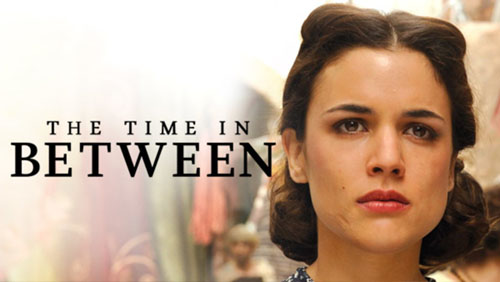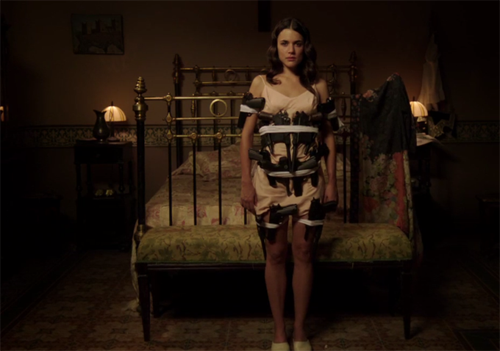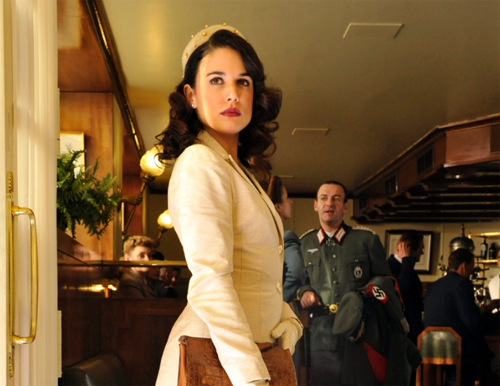Romance! Intrigue! Sewing! Wait. Sewing? Yes. Plying needle and thread has never been as spellbinding as it is in the award-winning historical drama The Time in Between (El Tiempo Entre Costuras) — dubbed the “Spanish Downton Abbey” — that began taking viewers in Spain by storm last October. Now audiences in the US can thrill to it, too.

Adapted from the international and The New York Times bestseller The Time in Between by María Dueñas, the miniseries follows the beautiful, talented, and courageous Sira Quiroga across two decades of her life — a life marked by personal tragedies, countries at war, and ultimately triumph.
The story begins when preteen Sira is an apprentice at Doña Manuela’s (Elena Irureta) dressmaker shop in Madrid, where she works alongside her seamstress mother Dolores (Elvira Mínguez). Sira carries finished dresses to clients’ homes and discovers a world of wealth, one that she will one day know well as couteriere to the rich and powerful.
As a young woman, Sira (Adriana Ugarte) is masterful in sewing and learning the ways of love when she meets and begins dating the sensible and practical Ignacio (Raúl Arévalo). When their wedding plans are marred by the news that Manuela must close her shop, Sira agrees to learn typing so she can join Ignacio in earning a wage through civil servitude, and accompanies him to purchase a typewriter at a local shop. Enter the devastatingly handsome and suave salesman, Ramiro (Rubén Cortada), to whom Sira soon abandons herself (and Ignacio).
Not only does Ramiro sweep Sira off her feet, he whisks her off to exotic Morocco, but not before she has another surprise meeting, this time with the father she never knew. Gonzalo Alvarado (Carlos Olalla) fears that he will soon be killed by Communists and so gives Sira an early inheritance of cash and jewelry worth a small fortune.
With her newly-acquired wealth, Sira and Ramiro live the high life in Tangiers, staying at a swanky hotel and spending every night on the town while awaiting word about his business proposal. That word never comes, but one of a different sort does, right before she discovers that he has scarpered with her money and jewels to chase another money-making scheme. Matters then go from bad to worse for the now alone and penniless Sira.
She awakens in hospital in Tétouan, the capital of the Spanish protectorate of Morocco, and accused of several crimes. But Chief of Police Vázquez (Francesc Garrido), like other powerful men the guapa Sira comes to meet, takes a shine to her and helps her, including getting her lodging at Candelaria’s (Mari Carmen Sánchez) boarding house, where several Spanish ex-pats while away the days as the civil war heats up back home. Her rent may be free, but Sira still has to pay the hotel bill in Tangiers. How is the question. Then a ripped skirt triggers the idea that will forever change her life. The thing is, financing it could put Sira’s life in mortal danger.

After finding the perfect space for her new atelier, Sira and neighbor Félix (Carlos Santos) become fast friends. Business, though, is slow. But once the wife of a German officer becomes a client, word of Sira’s skills as a couturiere spreads, including to British ex-pat Rosalinda Fox (Hannah New), the lover of the official in charge of Tétouan: Juan Luis Beigbeder (Tristán Ulloa). The two women befriend each other, and life is looking up for Sira… until Vázquez tells her that Ramiro has resurfaced.
With her debt to the hotel paid, Sira turns her attention to getting her mother out of war-torn Spain and into Morocco with help from the well-connected Rosalinda. Enter the devilishly charming Marcus Logan (Peter Vives), a British journalist who is her ticket to reuniting with Dolores. But why is Vázquez tailing him, and why do his articles appear oddly absent from the foreign press?
The attraction between Sira and Logan is obvious, and they go on a date to a reception for the brother-in-law of soon-to-be-dictator Francisco Franco. Little does she realize, though, that this posh affair would include her first taste of international espionage.
As Sira’s business continues to thrive, mother Dolores acclimates to Morocco, and the civil war in Spain ends, Logan is forced to flee Tétouan and Rosalinda moves to Madrid because of Beigbeder’s promotion in Franco’s goverment.
A year later Sira also returns to Madrid, not just as a couturiere but also as an agent of the British Secret Service and Spanish resistance movement. Her mission: infiltrate the inner circles of German clients and gather information in order to weaken Germany’s influence over Spain as World War II rages on. Her method of relaying that information: putting coded messages in the seams of her dress patterns.
Sira the spy also has a new identity — Aris Agoriuq — that prevents her from visiting old friends. However, when needs must, certain relationships do get re-established. So do a few that Sira/Aris hadn’t expected and could blow her cover.

A key player in German-Spanish dealings is the ruthless Portuguese businessman Manuel Da Silva (Filipe Duarte), who falls for Sira’s Aris persona. She in turn uses her couture and his silk import/export businesses as an excuse to get closer to him in Lisbon and get her hands on the information he receives from the Nazis. Time is of the essence and the stakes are getting higher, and even a minor mistake or mishap at this stage could unravel the whole plan and cost Sira her life.
Adriana Ugarte is brilliant as the naif-turned-sophisticate and spy Sira/Aris, displaying the character’s vulnerability, verve, and resolve as much if not more so in her expressions as in her delivery of the dialogue. (Speaking of, most of the script and direction are spot-on; the few exceptions stray into the melodrama of telenovela territory or are wholly unnecessary, such as close-ups that linger past the point of making the point or chatter that adds nothing to the story or a character whose qualities have been well established.)
Moving on. The costumes, sets, and on-location scenes in Morocco, Spain and Portugal are magnificent — all rich and colorful and full of period and local details that make the “Spanish Downton Abbey” an apt epithet and a miniseries to relish.
The El Tiempo Entre Costuras soundtrack, which won composer César Benito the Iris Award for Best Score for Television, consists of 25 tracks that are as much a delight for the ears as the series’ visuals are for the eyes. From haunting and reflective pieces to those that are grand and sweeping, the music shapes the program’s overall character as much as the sets, costumes, and characters themselves do. Listen to the compilation track above to hear what I mean. (The entire soundtrack, as well as individual tracks, are available for purchase and download at Amazon
and iTunes.)
Shown in 17 episodes in the US (versus 11 in Spain) that are roughly 45-minutes long, The Time In Between is currently streaming on DramaFever and Hulu in Spanish with English subtitles.
__________________
Add your comments on our Facebook and Twitter pages.
Share this post/page.
